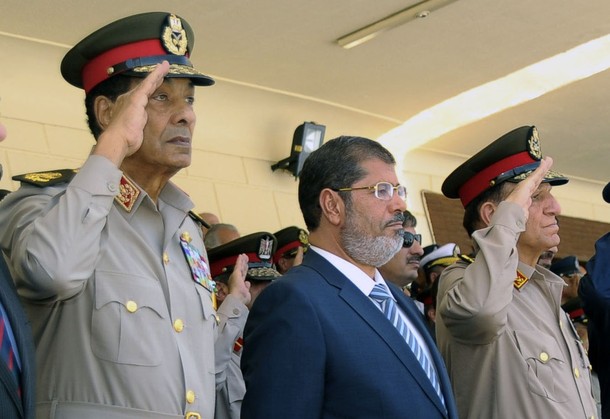
When Egypt’s President Mohamed Morsi announced on Sunday that he would issue a decree to reinstate parliament, his goal was not just to reel in his presidential authorities from the military, but to secure his campaign promises, according to sources close to the newly elected president.
Like any president who belongs to a certain political party, Morsi, an Islamist and Egypt’s first civilian president in 60 years, moved to guarantee that he would be backed by a government from his political background.
“If the parliament does not return, the president will have to appoint a government that is made up of at least 50 percent Freedom and Justice Party members,” Ibrahim Farag, Muslim Brotherhood activist and close aide to Morsi told me, a day before the president announced his decision.
Farag added that the president will most likely choose technocrats for the remaining 50 percent.
“The president has the right to form a government dominated by his own party, the Freedom and Justice Party, so he can achieve his "Nahda" [Renaissance] project." said Mohamed Abdelghaffar, an Egyptian lawyer and member of the syndicate.
Just when Egyptians thought that political stability was finally on the horizon with a newly elected president, the transition became even more muddled exposing a deeper power struggle between the president, his Muslim Brotherhood support-base and their longtime rivals, the military institution which has ruled Egypt for the past six decades.
Shortly after the presidential decree was announced, the Muslim Brotherhood planned a mass demonstration, filling Tahrir Square on Tuesday evening to show their support for the Islamist president. Supporters defied the military council and Supreme Constitutional Court, underlining that the “revolution’s” civilian president must have his full authorities. Adding to the murkiness on Tuesday evening, the Supreme Court, which previously made it clear that its rulings were final and binding, suspended Morsi’s decree to reinstate parliament.
Although the president’s decree seemed to be in direct defiance of the Supreme Constitutional Court’s ruling, which found that one third of parliament was elected under an “unconstitutional” electoral law, other legal experts have argued that the decree was within the president’s jurisdiction.
If reinstated, the elected parliament, which is made up of at least 70 percent Islamists, 47 percent of them belonging to the Freedom and Justice Party, the parliament would remain as the legislative body until a newly drafted constitution is approved, after which a new parliament would be elected, within 60 days
However, the president’s decree, which has fueled fears of legal and political instability, is still seen as an ongoing tug-of-war between the country’s two dominant political powers, the Islamists and the military council.
Almost a month ago, following the Supreme Constitutional Court’s ruling, the ruling military council, which had administrative authority at the time, dissolved the parliament in accordance with the ruling.
Morsi’s supporters, however, continued to argue that only an elected president could make such a move.
“Behind the scenes, SCAF remains in control of state institutions such as the judiciary, interior ministry, security apparatus, and the defense ministry,” said Ziad Akl, senior analyst with the Ahram Center for Political and Strategic Studies.
“There is a lobby inside the judiciary that is pro Muslim Brotherhood, but this lobby does not exist in the supreme constitutional court,” Akl said.
In March 2011, just weeks after the military assumed power when Hosni Mubarak stepped down, Mahmdouh Shaheen, one of the SCAF generals stated that the military needs assurances its interests will be guaranteed. The military council also reiterated that it would prefer to oversee the drafting of the constitution.
On June 17, just as election results were pouring in, forecasting that Morsi, the Muslim Brotherhood’s candidate would be the winner, the SCAF issued a constitutional declaration keeping its budget from civilian oversight while also giving itself the right to oversee the drafting of the new constitution.
In his first speech as president in the heart of Tahrir Square, the epicenter of Egypt’s uprising, Morsi underlined that he would not relinquish any of the presidential powers that the people entrusted him with, meaning that he would continue to push SCAF to revoke the ominous constitutional declaration which gives them sweeping powers.
“This contention is also more over the constitution,” Akl added.
Nonetheless, Farag, who is a close confidant to the president as well as leading FJP figures pointed out that the president Morsi is willing to negotiate with the Supreme Council of Armed Forces in order to reach an agreement that can appease all sides.
“It is clear that the military council has certain demands, and the president has no problem in negotiating to achieve a middle ground,” Farag said.
Reem Abdellatif is a Special Correspondent with the Los Angeles Times Cairo Bureau. Abdellatif began pursuing her journalism degree in 2005 at the University of South Carolina, but later transferred to the American University in Cairo to study and train in the Middle East. A bilingual Egyptian-American, Abdellatif holds a Bachelor’s of Arts in Journalism, with a minor in International Relations. Her work has been published with the Associated Press, GlobalPost, Daily News Egypt, Egypt Independent, Salon, and Los Angeles Times. From analysis to breaking news, her coverage focuses on economy, politics, human rights, and women’s issues.
Photo Credit: AP
Image: 610x_102.jpg
